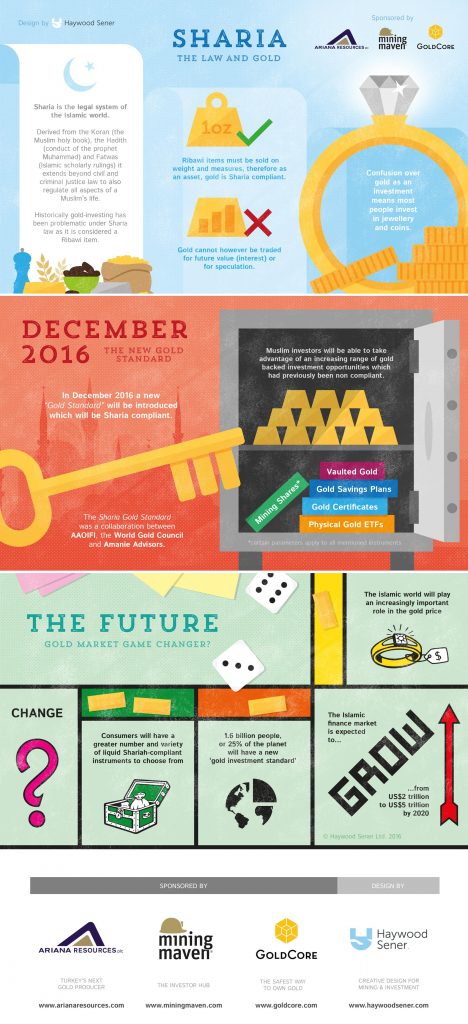Shariah Gold Standard Approved for $2 Trillion Islamic Finance Market
Commodities / Gold and Silver 2017 Dec 06, 2016 - 04:38 PM GMTBy: GoldCore
 by Jan Skoyles, Editor Mark O’Byrne : The Accounting and Auditing Organisation for Islamic Financial Institutions (AAOIFI) and the World Gold Council have made an important decision which was announced yesterday at the World Islamic Banking Conference in Bahrain.
by Jan Skoyles, Editor Mark O’Byrne : The Accounting and Auditing Organisation for Islamic Financial Institutions (AAOIFI) and the World Gold Council have made an important decision which was announced yesterday at the World Islamic Banking Conference in Bahrain.
This decision is about one of the most important markets in the world: the gold market, an invest-able market worth an estimated $2.4 trillion and is also of significance for the world of Islamic finance.

The AAOIFI, in collaboration with the World Gold Council (WGC) and Amanie Advisors, has approved what will become known as the Shariah Gold Standard. This is a set of guidelines that will expand the variety and use of gold-based products in Islamic Finance.
As many as 1.6 billion Muslims in the world, 25 per cent of the population, will have far greater access to the gold market than they have since the birth of modern finance, which has been primarily structured towards Western ideals.
More details were announced at the World Islamic Banking Conference including details of the gold products that are likely to be permissible.
The sharia gold standard announced yesterday allows the over 110 million investors in the Islamic world to invest in
a) vaulted gold
b) gold savings plans (such as GoldCore’s GoldSaver)
c) gold certificates
d) physical gold ETFs including “probably” the SPDR Gold Trust, the biggest exchange-traded gold (GLD)
e) gold mining shares (within certain Shari’ah parameters)
We know three things that the new Shariah gold-standard will achieve:
a) Increase diversity in the number of available Shariah gold compliant investment products
b) Greater emphasis on the role of physical gold in gold transactions
c) Islamic finance will have greater say in the setting of the gold price
To some, this may appear to be an unnecessary formality taken by the body whose guidelines are followed by Islamic finance institutions across the world. After all, physical gold is Shariah-compliant and holds a unique status for Muslims.
AAIOFI states, “From the perspective of Islamic Fiqh and the Islamic economic system, gold has its specific significance. This significance arises from the specific principles provided for gold and silver as Thaman in Shari’ah.”
According to Islamic texts, gold is a ribawi item, which means that it must be sold on weight and measure, and cannot be traded for future value or for speculation. In order for a gold instrument to be Shariah-compliant, the precious metal must be the underlying asset in related transactions.
However there has been a need for clarification for how gold bullion can be used for investment purposes by Muslims, for a long time.
This uncertainty has kept Shariah-compliant offerings at a minimum and many investors restricted by the type of gold bullion transactions they are able to partake in, with most focused on jewellery and coin offerings. Daud Bakar, chairman of Amanie Advisors, agrees, “.the existing Islamic standards for gold are fragmented, hampering product development and market demand.”
Currently in the gold market, the majority of activity regarding gold financial instruments is based almost entirely on speculation. This is due to the overwhelming size of both the London and COMEX (Chicago Mercantile Exchange) gold markets, which together have the greatest influence on the spot price of gold.
Whilst Islamic investors have always had access to the gold market through jewellery and coins, this guidance will vastly increase the number and diversity of investment products available. There are very few Shari’ah-compliant gold offerings today. Using its deep sector knowledge, GoldCore, and its Islamic partners, have been working on a comprehensive solution for two years and will provide the solution to qualifying Islamic financial institutions in early 2017.
With gold investment platforms such as GoldCore able to offer segregated, allocated gold bullion accounts with the option of physical delivery, Muslims are now able to invest in gold bars and coins.
The new ‘gold standard’ will affect the gold market globally as 1.6 billion people will be able for the first time to use gold bullion products and platforms that offer physical delivery, allocated and segregated gold ownership.
“For a number of years we have been working on an institutional gold platform and indeed a Sharia compliant gold bullion solution for the institutional market. As a market leader in precious metal storage, we have been consulting with major institutions and our strong partners to deliver allocated and segregated gold storage services to investors throughout the world”, said GoldCore CEO, Stephen Flood.
If Islamic Finance institutions were to allocate just one per cent of assets into new gold products then we would expect to see demand climb by about 500-1000 tonnes, per annum. Given that recent demand and supply figures showed a surplus of just 172 tonnes of gold in the market, we could begin to see some tightening with the increase of Shariah-compliant gold instruments, which will have a positive impact on the price.
It is not unreasonable to expect a minimum one per cent move of Islamic finance assets into gold, especially when you look at how it has performed. WGC data shows that in the last eight years the major Islamic asset classes (including REITs, the Takaful index, the Dow Jones Islamic Equities Index and the Dow Jones Sukuk Index) have all underperformed compared to gold, as have the major currencies used in the Islamic world.
Few appreciate that the launch of a Shari’ah gold or Islamic gold standard signals a changing dynamic in the gold market. Gold bullion will be additionally appealing to Islamic banks due to Basel III rules that require banks own high liquidity and quality, low counter party risk assets such as physical gold in allocated and segregated storage.
Until now, no group as influential as the AAOIFI has issued guidelines stating that gold must be the underlying asset in all gold transactions as we suspect they will do shortly.
Whilst the likes of the COMEX gold market are able to grow to multiple times the size of the underlying physical market, with little impact on physical demand or price, this will no longer be case.
Jan Skoyles is a research executive at GoldCore, a gold investment platform and this is a version of an article that first appeared in the Khaleej Times, the UAE’s best selling English newspaper and highest circulated English language newspaper in the Gulf
Gold Prices (LBMA AM)
06 Dec: USD 1,171.15, GBP 918.18 & EUR 1,086.94 per ounce
05 Dec: USD 1,164.90, GBP 915.84 & EUR 1,095.36 per ounce
02 Dec: USD 1,171.65, GBP 929.00 & EUR 1,100.88 per ounce
01 Dec: USD 1,168.75, GBP 930.09 & EUR 1,099.68 per ounce
30 Nov: USD 1,187.40, GBP 952.06 & EUR 1,115.44 per ounce
29 Nov: USD 1,187.30, GBP 952.45 & EUR 1,119.98 per ounce
28 Nov: USD 1,189.10, GBP 956.51 & EUR 1,117.99 per ounce
Silver Prices (LBMA)
06 Dec: USD 16.79, GBP 13.17 & EUR 15.63 per ounce
05 Dec: USD 16.62, GBP 13.05 & EUR 15.54 per ounce
02 Dec: USD 16.35, GBP 12.95 & EUR 15.36 per ounce
01 Dec: USD 16.30, GBP 12.91 & EUR 15.35 per ounce
30 Nov: USD 16.67, GBP 13.39 & EUR 15.66 per ounce
29 Nov: USD 16.54, GBP 13.26 & EUR 15.61 per ounce
28 Nov: USD 16.68, GBP 13.45 & EUR 15.73 per ounce
This update can be found on the GoldCore blog here.
IRL |
UK |
IRL +353 (0)1 632 5010 |
WINNERS MoneyMate and Investor Magazine Financial Analysts 2006
Disclaimer: The information in this document has been obtained from sources, which we believe to be reliable. We cannot guarantee its accuracy or completeness. It does not constitute a solicitation for the purchase or sale of any investment. Any person acting on the information contained in this document does so at their own risk. Recommendations in this document may not be suitable for all investors. Individual circumstances should be considered before a decision to invest is taken. Investors should note the following: Past experience is not necessarily a guide to future performance. The value of investments may fall or rise against investors' interests. Income levels from investments may fluctuate. Changes in exchange rates may have an adverse effect on the value of, or income from, investments denominated in foreign currencies. GoldCore Limited, trading as GoldCore is a Multi-Agency Intermediary regulated by the Irish Financial Regulator.
GoldCore is committed to complying with the requirements of the Data Protection Act. This means that in the provision of our services, appropriate personal information is processed and kept securely. It also means that we will never sell your details to a third party. The information you provide will remain confidential and may be used for the provision of related services. Such information may be disclosed in confidence to agents or service providers, regulatory bodies and group companies. You have the right to ask for a copy of certain information held by us in our records in return for payment of a small fee. You also have the right to require us to correct any inaccuracies in your information. The details you are being asked to supply may be used to provide you with information about other products and services either from GoldCore or other group companies or to provide services which any member of the group has arranged for you with a third party. If you do not wish to receive such contact, please write to the Marketing Manager GoldCore, 63 Fitzwilliam Square, Dublin 2 marking the envelope 'data protection'
GoldCore Archive |
© 2005-2022 http://www.MarketOracle.co.uk - The Market Oracle is a FREE Daily Financial Markets Analysis & Forecasting online publication.




